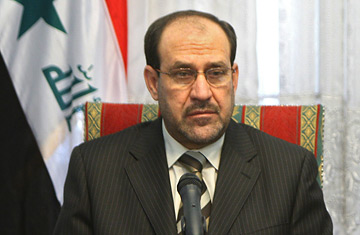
Iraqi Prime Minister Nuri al-Maliki.
From the beginning, the so-called surge of U.S. forces into Iraq was a political strategy, not a military campaign. The idea, as framed by U.S. military commanders in Iraq and policy-makers in Washington, was to have U.S. forces hold down violence in Iraq long enough to allow the government of Iraqi Prime Minister Nouri al-Maliki to press ahead with national reconciliation efforts. Those efforts, everyone hoped, would begin to diffuse Iraq's sectarian tensions enough to keep them from flaring up again when U.S. troops inevitably pulled back.
U.S. troops, at their highest level ever in Iraq, have delivered visible results in recent months. Violence in Baghdad in particular is down significantly. In a matter of months, Anbar Province, with the help of tribal leaders, has gone from a virtual lost cause to the greatest U.S. achievement in years of struggle. To be sure, violence is still extraordinarily high, especially in places like Diyala Province. And the situation in Anbar is fragile at best as other problems loom ever larger in the face of political stalemate in Baghdad. But anyone wondering whether the surge strategy has brought gains is hard-pressed to deny some positive developments in Iraq since February, when the U.S. buildup began in earnest.
But while the security situation in Iraq has arguably improved, the political side has deteriorated to its worst state of disarray since Maliki took office. U.S. Ambassador Ryan Crocker, speaking to reporters Tuesday in the Green Zone, was blunt in his bleak assessment. "Progress on national level issues has been extremely disappointing and frustrating to all concerned — to us, to Iraqis, to the Iraqi leadership itself," said Crocker, who echoed rising voices of discontent in Washington. "Our support is not a blank check."
Crocker and Iraq watchers in Washington seem to be pinning much on political talks in Baghdad, where Maliki has been huddling with key leadership figures from the country's factions in recent days. Last week Maliki, following the refusal of key Sunni leaders to resume participation in the government, called an emergency political summit. Iraqi Vice President Tareq al-Hashemi, one of the last prominent Sunni figures willing to be seen talking to the Shi'ite Maliki, was summoned. So was Kurdish President Jalal Talabani and Shi'ite Vice President Adel Abdel Mahdi as well as Massoud Barzani, president of the northern Kurdish region.
Days of closed-door meetings have ensued and are expected to continue through the week, perhaps longer. At bottom the issue is Maliki's inability thus far to forge a compromise with Sunni factions, who accuse Maliki, with good reason, of pursuing a sectarian agenda. But the prospects for success of the talks are dim. No signs of compromise have emerged despite days of meetings. And if Maliki's government remains shunned by Sunni leadership when the talks finally end, the political reconciliation the surge was meant to spur will have gone backward, not forward.
Crocker, at least, is still holding out hope, despite his rather grim take on the current circumstances. The fact that the talks are even happening, he says, is a sign that Iraq's leaders are committed to working together to find solutions that may yield some political advances ahead of the September progress report he and top Iraq commander Gen. David Petraeus are to deliver in Washington. "We do expect results, as do the Iraqi people," said Crocker. Expectations in Iraq, however, have a four-year history now of turning into disappointments.
